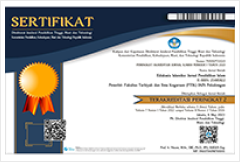Problematika Pendidikan Islam di Indonesia: Eksplorasi Teori Motivasi Abraham Maslow dan David McClelland
DOI:
https://doi.org/10.28918/jei.v3i2.1687Keywords:
Motivation, Maslows Hierarchy of Needs Theory, Mc Clellands Need for Achievement Theory, Issues of Islamic EducationAbstract
This paper aims to offer a comprehensive idea for one of the issues of Indonesiaâs education, particularly in Islamic education. The issues deal with low student achievement as well as the phenomenon of teacher situated in a mechanistic curriculum, through motivation theories proposed by Abraham Maslow and David McClelland. A qualitative approach was designed in this library research. The study employed discourse analysis and cultural analysis as the methods of data analysis regarding the reality of Indonesiaâs education. This study promotes the urgency of enhancing students motivation in experiencing Islamic education, either by fulfilling five basic needs as suggested in the Maslows theory or by fostering need for achievement (nAch) as portrayed in the McClellands theory, to explore the national education problems. This study depicts that motivation constitutes the main factor that significantly contributes to students achievement. It, likewise, denotes the students abilities in developing learning materials through their creativity and innovations in terms of their own potential, specifically for Islamic education
References
Afzal, H., Ali, I., Khan, M. A., & Hamid, K. (2010). A Study of University Students’ Motivation and Its Relationship with their Academic Performance. International Journal of Business and Management, 5(4), 76-80.
Ali, F. (2018). Incorporating Values of Moderate Islam for the 21st Century Learners in an English as a Foreign Language Class. Edukasia Islamika, 3(1), 18-31.
Apriansyah, S. (2014). Hubungan Antara Prestasi Belajar dengan Perencanaan Karir. PSIKOPEDAGOGIA: Jurnal Bimbingan dan Konseling, 3(2), 78-85.
Ardhini, D. (2012). Hubungan Motivasi Berprestasi dan Kepercayaan Diri dengan Prestasi Belajar Siswa Kelas Olahraga SMP Negeri 4 Purbalingga. Skripsi Fakultas Ilmu Keolahragaan, Universitas Negeri Yogyakarta.
Djamarah, S. B. (2002). Psikologi Belajar. Jakarta: Rineka Cipta.
Fadli, F., & Susanto, N. H. (2017). Model Pendidikan Islam Kreatif Walisongo melalui Penyelenggaraan Pendidikan yang Menyenangkan. Jurnal Penelitian, 11(1), 25-54.
Gardner, H., & Hatch, T. (1989). Educational implications of the theory of multiple intelligences. Educational Researcher. 8(8), 4-10. https://doi.org/10.3102%2F0013189X018008004
Gunadi, C. L., & Gunawan, W. (2016). Hubungan Motivasi Akademik dengan Prestasi Belajar Siswa SMA ‘X’ di Jakarta Barat. Noetic Psychology, 4(1), 23-42.
Hadriana, M. Ismail, A., & Mahdum. (2013). The Relationship between Motivations and Self-Lear¬n¬ing and the English Language Achievement in Se¬con¬dary High School Students. Jurnal Asian Social Science, 9(12), 36-43.
Iswadi, H. (2016). Sekelumit dari Hasil PISA 2015 yang Baru Dirilis. Diperoleh pada 22 Juni 2018 dari http://www.ubaya.ac.id/2014/content/articles_detail/230/Overview-of-the-PISA-2015-results-that-have-just-been-Released.html
Lee, I. (2010). The Effect of Learning Motivation, Total Quality Teaching and Peer-Assisted Learning on Study Achievement: Empirical Analysis from Vocational Universities or Colleges’ Students in Taiwan. The Journal of Human Resource and Adult Learning, 6(2), 56-63.
Maslow, A. H. (1993). Motivasi dan Kepribadian. (Terjemahan Nurul Imam). Bandung: Remaja Rosdakarya Offset.
McClelland, D. (1961). The achieving society. Princeton, NJ: Van Nostrand Company Inc.
Mendari, A. S. (2010). Aplikasi Teori Hierarki Kebutuhan Maslow dalam Meningkatkan Motivasi Belajar Mahasiswa. Jurnal Ilmiah Widya Warta, 34(01), 82-91.
Mikhriani. (2008). Manajemen Diri dan Kajian Psikologi: Perspektif Tiga Motif Sosial David McClelland. Jurnal MD, I(1), 11-32.
Musyaddad, K. (2013). Problematika Pendidikan di Indonesia. Jurnal Edu-Bio, 4(1), 42-58.
Narwoto. (2013). Faktor-faktor yang Berpengaruh terhadap Prestasi Belajar Teori Kejuruan Siswa SMK. Jurnal Pendidikan Vokasi, 3(2), 222-233.
Nugroho, P. A. (2012). Hubungan antara Motivasi Berprestasi dengan Prestasi Belajar Mata Pelajaran UASBN pada kelas VI SD Negeri 3 Lemahputih Kecamatan Brati Kabupaten Grobogan tahun pelajaran 2011/2012. Skripsi Universitas Muhammadiyah Surakarta.
Prihartanta, W. (2015). Teori-teori Motivasi. Jurnal Adabiya, 1(83), 1-14.
Rahmawati, V. (2014). Teori David McClelland. Diperoleh pada 11 Agustus 2018 dari http://www.academia.edu/9480878/TEORI_DAVID_McCLELLAND
Robbins & Judge. (2007). Perilaku Organisasi. (Terjemahan Diana Angelica). Jakarta: Salemba Empat.
Rosana, D. (2009). Model Pembelajaran Lima Domain Sains dengan Pendekatan Kontekstual untuk Mengembangkan Pembelajaran Bermakna. Jurnal Penelitian dan Evaluasi Pendidikan, 13(2), 268-285.
Roestiyah, N. K. (1982). Masalah-Masalah Ilmu Keguruan. Jakarta: Bumi Aksara.
Siagian, R. E. F. (2012). Pengaruh Minat dan Kebiasaan Belajar Siswa terhadap Prestasi Belajar Matematika. Jurnal Formatif, 2(2), 122-131.
Smith, R. L. (2011). Achievement motivation training: An evidence-based approach to enhancing performance. Ideas and research: VISTAS.
Sulistyorini. (2009). Evaluasi Pendidikan dalam Meningkatkan Mutu Pendidikan. Yogyakarta: Teras.
Susanto, N. H. (2017). Walisongo’s Educational Leadership through Modelling and Fulfilment of Human Basic Needs. Jurnal Pendidikan Islam, 6(2), 311-330.
Thaib, E. N. (2013). Hubungan Antara Prestasi Belajar dengan Kecerdasan Emosional. Jurnal Ilmiah Didaktika, XIII(2), 384-399.
Trisanta, A. B. (2017). Implementasi Pendidikan Humanis di SMA Negeri 6 Yogyakarta. Skripsi Fakultas Ilmu Pendidikan, Universitas Negeri Yogyakarta.
Wahyudi. (2010). Memahami Motivasi Berprestasi Siswa. Jurnal Guru Membangun. 25(3), 1-6.
Winardi, J. (2001). Motivasi dan Pemotivasian dalam Manajemen. Jakarta: Raja Grafindo Persada.






















